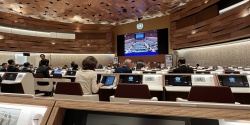Published: 28.11.2022

· The Human Rights Council Forum on Human Rights, Democracy and the Rule of Law took place at UN headquarters in Geneva.
· The event was attended by representatives of states and specialized UN agencies, academics and NGOs.
· This year's Forum was dedicated to discussing ways to strengthen democracy and the rule of law in a post-pandemic perspective.
· A representative of the Ordo Iuris Institute took part in all panel discussions, pointing out the need to preserve fundamental rights and freedoms when creating regulations to counter situations such as a pandemic.
· She also stressed the importance of family support for the cohesion of society and demographics.
The fourth session of the Forum on Human Rights, Democracy and the Rule of Law was held under the title "Strengthening democracy for better reconstruction: challenges and opportunities." Weronika Przebierała, director of the Center for International Law at the Ordo Iuris Institute, attended the event and was present during all the panels, speaking in the discussion.
On the first day of the Forum, panel discussions focused on the impact of the pandemic on human rights, as well as the challenges of strengthening democratic institutions and citizens' trust in them. The representative of the Institute pointed out that in any case of creating regulations to prevent and counteract situations such as a pandemic, one must not forget that there are limits to interference in the sphere of rights and freedoms. The human rights system starts from the premise that fundamental rights and freedoms arise from the very fact of being human. They are not bestowed by those in power, and the exercise of them cannot be treated as a privilege.
Weronika Przebierala also stressed that strengthening democratic institutions and increasing citizens' trust in them is possible only when decisions made by those in power are rational, based on scientific arguments and made with respect for the fundamental rights and freedoms of the individual. Trust can only be built on truth and mutual respect.
On the other hand, on the second day, the discussion was dominated by a debate on the measures and tools to be implemented to improve social dialogue, ensure justice in society and guarantee its cohesion. The Ordo Iuris representative pointed out that strengthening social dialogue requires promoting and supporting freedom of expression, one of the most precious values in democratic societies, making dialogue not only fair, but also constructive, and therefore beneficial to society as a whole. In view of this, all proposals to regulate "hate speech" should be carefully analyzed, which not infrequently contain very general categories of concepts, leading to situations in which the qualification of speech as "hateful" is made on the basis of the subjective opinion of the listener, without objective indicators. However, criminal law in a civilized society cannot be based on unquantifiable, subjective categories.
The director of the Center for International Law further noted that concern for cohesion in society should also bear in mind concern for its basic cell, which is the family, and include support for it. This would also have a positive impact on the demographic crisis facing Europe. Weronika Przebierała also stressed that a just society is one that protects its most vulnerable members - especially those who cannot protect themselves, including unborn children.
"The forum is a valuable event to learn about the human rights perspective of people from all over the world and get an idea of what problems they face in terms of democracy and the rule of law. Participation in this type of event is crucial for representatives of human rights NGOs, as it allows them to actively participate in the debate and make recommendations that will become part of the final report of the session," commented Weronika Przebierała, director of the Center for International Law at the Ordo Iuris Institute.
The Forum was established in 2015 through a resolution of the Human Rights Council with the aim of creating a platform to promote dialogue and cooperation on issues concerning the relationship between the areas indicated in its name. It aims to identify and analyze best practices, challenges and opportunities for states in their efforts to ensure respect for human rights, democracy and the rule of law.
In addition, it seeks to improve cooperation and exchange experiences among human rights actors, including United Nations bodies and specialized agencies, states, non-governmental organizations, experts and academics.

17.04.2025
• The Ordo Iuris Institute has prepared an opinion for the UN as part of a thematic report on surrogacy and its impact on the rights of women and children.

• Representatives of Ordo Iuris took part in the second round of consultations ahead of the 58th Session of the UN Commission on Population and Development (CPD58) on global health policy.

09.04.2025
• On April 8, the Ordo Iuris Institute presented the Polish version of a document with proposals for reforming the European Union, prepared jointly with Hungary’s Mathias Corvinus Collegium (MCC).

08.04.2025
Sixth Court Hearing Ends Without Progress